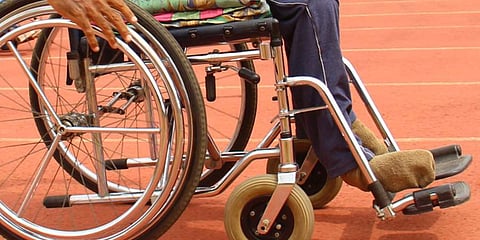

NEW DELHI: Persons with disability (PwD) not only faced difficulties in accessing emergency medical and rehabilitation services but underwent deep psychological traumas, disruption in their daily lives and loss of livelihood, said a first national-level study that evaluated the impact of Covid-19 and resulting lockdown on persons with disabilities (PwD) in India.
The study, carried out in 14 Indian states, was conducted by South Asia Centre for Disability and Inclusive Development and Research (SACDIR), Indian Institute of Public Health (IIPH), Hyderabad, said that parents with children were significantly impacted due to lockdown in the areas of medical, rehabilitation, education and mental health services.
“COVID-19 and the associated lockdown restrictions have negatively impacted persons with disabilities during the first wave in India. It is critical to mainstream disability within the agenda for health and development with pragmatic, context-specific strategies and programs in the country,” the study said.
According to Prof GVS Murthy, director of the institute and the report's author, there is a lack of data to quantify the impact of the pandemic on PwD, who are more vulnerable and at higher risk from Covid-19.
Speaking to The New Indian Express, Murthy said people with disabilities faced many challenges during the pandemic, not only in accessing healthcare, getting rehabilitation services, and social support but in education too.
The study, published in the International Journal of Environmental Research and Public Health, said PwDs faced psychological reactions to Covid-19, which ranged from fear, anxiety, panic, hopelessness and depression to fear of infection.
“This led to a feeling of stigma, discrimination, and isolation, combined with issues in relationships, abandonment, and violence,” the report added.
The study found that about 60 percent of the PwDs found it challenging to access emergency medical services during the lockdown, and 4.6 percent post lockdown.
Nearly 50 percent had problems getting health services, while more than 25 percent could not get regular medicines, hospital appointments and surgical procedures.
Over 70 per cent had no access to Covid-related information, which was worse for visually and deaf people.
“Most had no access to Covid information in the absence of communication and messages available in Barielle, sign language or lip reading. They didn’t understand the messages on dos and don'ts of Covid-19 and were thus more vulnerable. Even using hand sanitiser as a safety measure was not clear to them,” he said.
More than 90 percent of the participants with either physical, speech, hearing, or visual impairment were impacted by the lockdown in receiving rehabilitation services.
About 76 percent of respondents were apprehensive of the risk of infection during the lockdown, which increased to 92 per cent post lockdown.
“PWDs felt that the lockdown restrictions had negatively impacted their productivity, social participation, and engagement in everyday activities. Access to medicines and rehabilitation services was tough and detrimental to the therapeutic benefits they gained during the pre-pandemic time,” the study said.
“None of the pandemic mitigation plans and services was specific or inclusive of PwDs,” it added.
It further said that almost all respondents needed assistance for daily living and depended on family members as their carers. Many had to borrow money, with government disability pensions affecting a third of the respondents.
Using a cross-sectional, mixed-methods approach, data were collected from a representative sample of 403 persons with disabilities in 14 states, including Kerala, Tamil Nadu, Andhra Pradesh, Karnataka, Telangana, Maharashtra, Odisha and Delhi, during the Covid-19 first wave at two different points – during the lockdown in May and post-lockdown phase in July.
The study was conducted with a diverse mix of participants, including policymakers, program planners and implementers
What the study reveals
The study found that 60 percent of People with Disability (PwD) found it difficult to access emergency medical services during the lockdown, and 4.6 per cent post lockdown
Nearly 50 percent couldn’t get access to health services
Over 90 percent of people with either physical, speech, hearing, or visual impairment were impacted by the lockdown in receiving rehabilitation services
25 percent couldn’t get regular medicines, hospital appointments and surgical procedures
Over 70 percent had no access to Covid-related information
76 percent were apprehensive of the risk of infection during the lockdown, and this increased to 92 per cent post lockdown
Parents with children were hugely impacted in getting access to medical, rehabilitation, education and mental health services
None of the pandemic mitigation plans and services was specific or inclusive of PwDs
PwDs faced psychological reactions to Covid-19, which ranged from fear, anxiety, panic, hopelessness and depression to fear of infection
Most were dependent on their caregivers
Many had to borrow money as government disability pensions were impacted